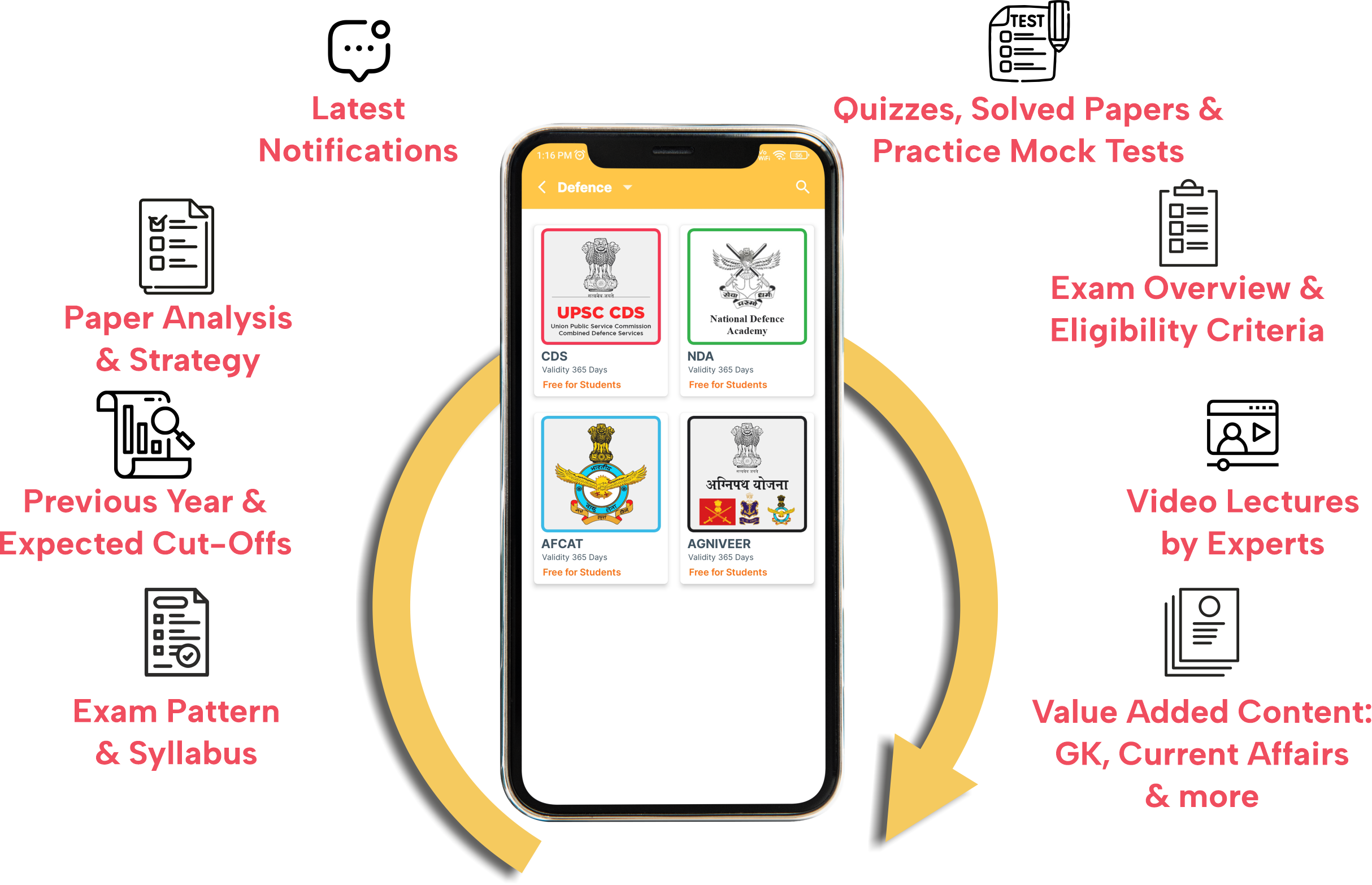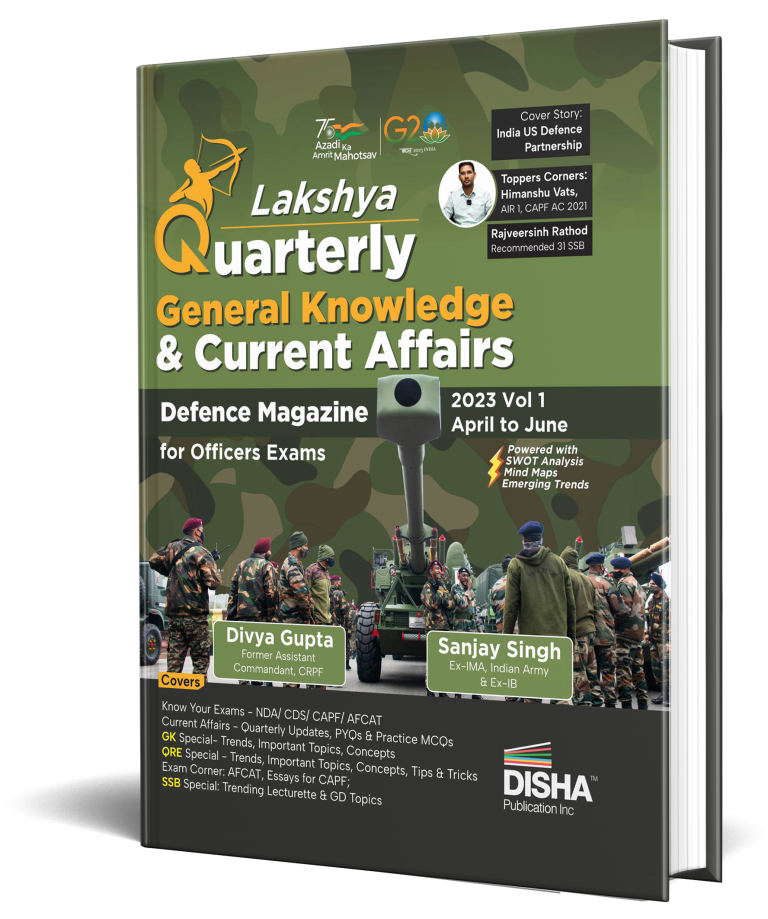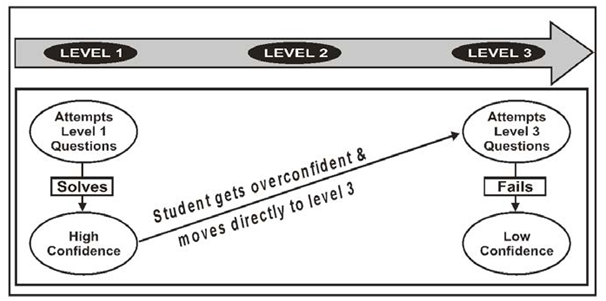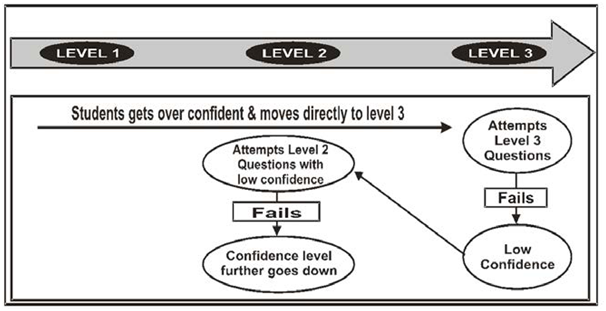
Welcome to Disha’s OFFICERS DEFENCE ACADEMY, which is a One-Stop Knowledge Point for all your requirements pertaining to the best Study Material for Defence Entrance Exams in India.
The Most Important Exams conducted by Government are National Defence Academy/ Naval Academy (NDA/NA), Combined Defence Services (CDS), Air Force Common Admission Test (AFCAT) and Central Armed Police Forces exams being organized every year.
Every year around 20 to 25 lakh students appear in various Defence Entrance Exams. Disha’s OFFICERS DEFENCE ACADEMY helps you to keep abreast with Defence study materials, about the latest notifications, changes in exam patterns/ structure, solved papers, trends, Latest Mock Papers, Concept Notes, Sample e-books, Online Tests, Cut off Marks, Strategies & Tips to crack the Defence exams etc.
FREE Study Material for Defence Exams
Download Value Added Content: PDF
Download SWOT Analysis: PDF
Download MINDMAP: PDF
Why choose a career in Defence?
Indian Defence Services offer dignified, prestigious, and lucrative career opportunities. As a part of the Indian defence services. One can serve in the Army, Air Force or Navy, on combat duty, on administrative assignments, in the medical services, engineering services, in the JAG’s Department, or in the Education Corps.
The nature of responsibilities varies with the diverse range of activities in the defence services. The recruitment to the Armed Forces is voluntary and every citizen of India, irrespective of his caste, class, religion and community, is eligible for recruitment into the Armed Forces, provided he meets the laid down physical, medical and educational criteria.
Types of Exams:
- Central Armed Police Forces (CAPF AC)
- National Defence Academy/ Naval Academy (NDA/NA)
- Combined Defence Services (CDS)
- Air Force Common Admission Test (AFCAT)
Download Disha App to avail Exclusive FREE Study Material

Disha has always been the guiding force in aspirants’ preparation for years; only now Disha has a state of the art Mobile Application that has combined the best of both worlds, that is, Best Study Resources with FREE Online Mentorship.
Download Disha’s Official App to explore Free Exclusive Content, Exam Information, Quizzes, Mock Tests, Live Classes, Online Courses, Videos, Bookstore and more!
Disha Publication is designed to be the most trustworthy & student-friendly app to prepare for all competitive exams. We aim to provide the finest and most affordable learning experience to aspirants and students looking for quality guidance as well as study material to build careers in various sectors.
Prep Smart with Disha App
Loaded with everything you need to crack
CAPF AC | NDA | CDS | AFCAT

Interview with UPSC CAPF AC Topper
AIR 1, Himanshu Vats: Tips, Strategy & more

Find out the Topper’s Secret! Disha Publication is proud to present this exclusive interview with the All India Rank 1 Topper of UPSC CAPF AC Exam 2021. Himanshu’s excellent scores are a result of his strategic hard work. In this video, Himanshu Vats shares his complete strategy and tips that he adopted during his preparation to guide the present-day aspirants of CAPF AC. His message to everyone is that you need to believe in yourself and keep working hard to achieve your goal. Know all the crisp and interesting details of Himanshu’s personal approach to CAPF exam preparation. We are happy to share that Himanshu had referred to three of Disha’s books during his preparation which helped him to achieve great scores.

Target GK & Current Affairs for all Defence Exams with Disha’s Latest Release
Lakshya Quarterly Magazine!
Books that make Toppers!
FREQUENTLY ASKED QUESTIONS
Defence exams are not easy to crack. So, time management is a very crucial part of the preparation. This is because the time is limited and the Syllabus is vast. So the candidates need to make the best possible utilisation of time. Also, if the time managed properly, aspirants will end up wasting time on irrelevant things, while leaving the essential things uncovered. An aspirant should necessarily maintain a time log. This will help them to keep a track of how they spend each hour.
Here are some tips for time management
- Make a schedule and divide your day.
- Keep at least 4 – 5 hours a day for studies (if attending coaching, you’ll be able to give only 2 – 3 hours a day).
- Devote around 1.5 hours for reading newspaper and making current events notes. Don’t skip newspapers, nor postpone reading them. You will never find time to complete them later.
- Maintain a habit of reading current affairs magazine.
- Setting deadlines and targets that are small and realistic will help you complete the syllabus within time.
- Get a proper sleep for 6 – 8 hours a day.
- You must spend 1- 2 hours for some physical activities like jogging, cycling, yoga or playing a sport and leisure activities like music, dance, painting, etc.
- Stop studying thoroughly at least 24 hours before the exam as studying now will only leave you anxious. You can go through the Mind Maps of subjects and topics. Just relax yourself for this day.
Planning is important because it tells us how to reach our destination or goal. In the context of the Defence Exams, planning acquires greater significance because one has to cover a comprehensive syllabus in a limited period of time. Good planning really implies maximum results with minimum efforts. Effective planning means that an aspirant works out a mechanism of his own, for checking whether he/she is spending the time effectively or not. Thus, focus on the following tips for success in Defence Examinations.
Master the Basics
Aspirants must keep in mind the following: “The questions are likely to test the candidate’s basic understanding of all relevant issues and ability to analyse and take a view on conflicting socio-economic goals, objectives and demands. Thus, aspirants don’t have to master the topics, all they need is BASIC UNDERSTANDING and the ability to analyse. Basic understanding comes from reading and re-reading. Ability to analyse what they have understood from reading comes from WRITING PRACTICE.
Start From Weak Areas
There is no syllabus in detail or specific for subject or areas for Tier-I point of view. Any question in it can be asked from anywhere, so aspirants must begin their planning and study for subject area in which they are weak. When the weak areas can be overcome, a new confidence will develop that will motivate to cover up other areas/subjects easily and quickly.
Apply Intelligent Meditation in Preparation
It is very important to analyse previous questions asked in Defence Exams and then think over all the aspects and dimensions on which questions can be formed and asked from a particular topic or heading.
Prepare Own Notes & Mind Maps
Writing notes is very helpful in preparing for the examination, particularly when an aspirant studies from different sources. Firstly, while writing notes, the focused aspirant is in a more concentrated manner and many of these points remain in their memory, if they put them on a Mind Map. Secondly, notes help in quick revision. For writing effective notes, do not start in a hurry, i.e. when aspirants are reading the material for the first time. Without understanding what is read, the candidate is likely to write down too much which may amount to simply reproduction of the material. After understanding the text book for the main points and sub-points, try to write in own words rather than using the same language. While doing this exercise, get sincerely involved and write short notes preferably in points, one liner, short sentence, one or two words, short names or abbreviations. These notes will help in revising the chapters or topics easily in lesser time.
REVISION IS THE KEY TO SUCCESS
Revision is the most important aspect of preparation for any exam, whether it is academic or competitive. Like study strategy, there is no fixed revision format that will suit each and every aspirant. Aspirants should think over which format can be best and suit them in revision. They can go through others revision techniques before making their own. But revision strategy should be prepared in such a way that will help the aspirants to achieve their study goals in the best possible way. Here are some guidelines that will help the aspirants in making best suited revision strategy for defence exams preparation.
- Three Tier Revision Strategy
The most suited and successful revision strategy for any exam, particularly Defence exams preparation is Three Tier Strategy. This format is based on three labels, i.e. day-wise, week-wise and month-wise. Daily revision is divided into two stages, morning and late-night. In the morning, aspirants should quickly revise all the subjects, chapters and topics they have studied previous day, thereafter, they should start studying new subject/chapter topic for the day. Before going to sleep late in night after study, they must revise all the points they have studied the whole day. Weekly Revision: It is the second stage of revision which covers all the topics, chapters and a subject, an aspirant has studied in a week, i.e. from Monday to Saturday. It is mostly fixed on Sunday.
Monthly Revision: Just like weekly revision, monthly revision is the third stage of revision of the same topics and chapters, which an aspirant has already revised weekly and daily in a month. This model of revision strategy will help the aspirants to remember whatever they studied in a month.
The next revision can be after three and six months to freshen up aspirant’s memory of the studies done in this duration. It will help the aspirants in building their confidence in preparation and cracking the exam.
Three Tier Revision Strategies
| Subject | Chapter | Topic |
Daily | Subject name | Chapter name | Topic name |
Weekly | do | do | do |
Monthly | do | do | do |
- Listing of Topics for Revision
Aspirants study many topics from different subjects and chapters in a day, week and month. But all the topics are not equally relevant and important from exam point of view. So, they must list those topics which are important for revision according to their relevance, complexity and marks allocated for the exam. It will help aspirants to keep a check and complete their revision tasks within the time limit.
- Prioritise Subject and Topic
Aspirants list many more topics and chapters for revision. But due to lack of time for weekly and monthly revision, they are unable to revise all the listed topics. So, they should prioritise topics for revision according to their importance in the examination and revise accordingly.
- Application of Technology in Revision
Important points of a topic or chapter should be noted down on Memo pad of a mobile phone or tablet to revise during travelling to and from to coaching.
- Practice Tests
After completing a chapter or topic during preparation, aspirants should test their learning through Practice Test based on that particular topic or chapter. These practice tests are designed on the same examination pattern as followed by CDS, NDA, CAPF & AFCAT to prepare exam. These practice tests will help in evaluating the aspirant’s preparation. These tests are a mode of revision for the topic or chapter.
- Solve the Topic’s Quizzes
When aspirants finish the topic during preparation, solve the quizzes or questions prepared on that particular topic so that they can assess their preparation and list the topic for revision accordingly.
- Solve previous year question papers at regular intervals
To stay on the right path or get on track quickly, the aspirants should keep testing themselves against the previous defence papers to know the effectiveness of their preparation and identify and overcome their weak points. For this they should grab the previous 5 years solved section-wise Paper Set.
- Go for Online Mock Test
After completing syllabus and revision, aspirants can go for a mock test. Conducted in a proper way, a mock test makes aspirants feel the environment and experience of the real exam. It is useful in reviewing their knowledge of the subjects and judging their weak and strong areas of preparation. Through mock test, they can also test their ability of time management. Do not miss the opportunity as and when any institute conducts mock test. They can take mock test online.
- Planning for Defence Exams
General Intelligence and Reasoning section plays a very important role in defence Exams. The chances of Reasoning Questions being attempted wrongly by the candidates are high. Therefore, negative marking in this section is comparatively higher. Generally, candidates find it difficult to score good marks in Reasoning Test, because most of the topics create confusion in their mind and they lack proper knowledge and guidance to perform well.
- How to develop interest/ Confidence?
An easiest way to develop confidence/interest is to approach the subject in a systematic and step by step manner. Usually, students skip some of the fundamental steps and approach problem solving with half-baked knowledge because of which they get stuck and slowly and slowly develop dis-interest in the subject. Let us find out different approaches adopted by the students.
Approach 1

Approach 2

Approach 3
In Approach 3 the student moves from Level 1 to 2 and then to 3 and constantly refers theory and text as and when the problem occurs.
So to summarize:
- It is very important to develop confidence in subject. Confidence level also leads to higher interest in the subject.
- The student develops confidence in a subject in 5 to 6 sittings
- Even if the scores are low during the initial sitting the student should not give up but rather spend more time on the topic
- In addition to adopting correct approach to studying, following techniques will aid your concentration:
- Whenever you find you mind wandering become conscious of the fact that your mind has wandered and bring it back to what you are studying. Do not let frustration come in the way. You will find that with passage of time, you become better and better at catching the mind from jumping here and there.
- Everyday set aside 10-15 minutes during which time you are going to completely concentrate on a particular activity. The activities, which you can concentrate, can be – praying, walking, eating, and looking at a still picture/clock and so on. Whenever you find that your mind has wandered, gently bring back the mind, review the thought that distracted your mind and get back to the task of fully concentrating on your activity.
- Environment of study. Proper lighting is important. If your eyes are getting strained, you will not be able to concentrate. Ensure that you are sitting comfortably and the light is optimal. Again noise distractions should be minimal. It is difficult to concentrate when you are in a noisy room.
- Studies should be concentrated around your peak performance. Study hard during your peak hours of performance. Schedule your study such that the peak consumes those activities, which need concentration, high problem solving skills and alertness. During other hours, you may want to perform routine activities.
- Be active in what you do e.g. speak aloud, talk to someone, and write notes.
- Set yourself realistic small targets. This will give you more chance to succeed in reaching your goal. Success will increase both your self- confidence and your study efficiency.
- Vary both the topics you study and the methods you use.
- Study for short periods of time, at least initially
- Check your sleep: Lack of concentration is often due to lack of complete sleep. So don’t increase your study hours at the cost of your sleep.
Apply above mentioned techniques in your studies and soon your concentration related problems will go away.















